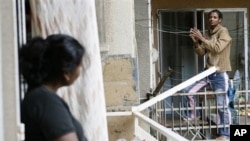If they all moved to one country, migrant workers would be the world's fifth most-populous country. In Lebanon, hundreds of thousands of women from South Asia and Africa live in Lebanese homes, working as maids. Activists say behind closed doors, abuses go unchecked and legal protection is rare.
Aid workers found this Sri Lankan woman, who asked to be called Nilu, in a hospital with wrists crushed by a hammer, welts all over her body, and a broken back.
Nilu spent six months sleeping on the floor of her Lebanese employer's kitchen. She worked seven days a week as a maid and was not allowed to go out. She says even the smallest offense, like forgetting an item on the shopping list or not noticing water on the bathroom floor, would drive her mistress to beat her.
Nilu is one of about 200,000 foreign women in Lebanon working as a maid. Many women say their hours are long and the work is hard, but they are not abused. Hailing from poorer countries like Ethiopia, Bangladesh, Sri Lanka, Nepal and the Philippines, women say they come to Lebanon to make money, so they can help take care of their families at home.
Worldwide, migrant workers sent $316 billion to developing countries in 2009, often three times the amount of money coming from aid agencies and foreign countries.
The International Organization for Migration says women who travel abroad to work in homes are often vulnerable to abuses. In Lebanon, Human Rights Watch says the situation is critical. Workers who flee their employers are arrested and deported. And employers, even those accused of physical and sexual abuse, are rarely held legally accountable.
Beirut Human Rights Watch Director Nadim Houry says problems for migrant workers in Lebanon often begin in their home countries. Poorly regulated agencies make false promises to often desperately poor women.
Once in Lebanon, the women find little protection. Like in many countries, Lebanese labor laws designed to protect employees do not apply to domestic workers. In 2009, the Lebanese government adopted a standard contract for foreign domestic workers that guaranteed basic rights, like time off, and payment of wages. And while the contract is a positive step, Houry says it is not effective.
"While the contract is being signed, one, it has not yet been translated to the migrant's language, so many of them do not know what they are signing," said Houry. "But more importantly there has not been any enforcement mechanism. So these contracts, in a way, are not worth the ink that their signed on. That is it."
Inside Lebanese homes, 80 percent of employers confiscate their domestic workers' passports. Most employers do not allow the women to have a day off outside of the home. Less frequently, but still commonly, employers withhold pay. Employers pay about $3,000 to bring in a domestic worker from overseas. Houry says that employers delay wages so the workers do not run away.
Violence against domestic workers is also believed to be widespread. But maids rarely report beatings and sexual abuse inside their employer's homes. Those that do report abuses risk getting kicked out of Lebanon because the law requires workers to stay with their employers to retain their visas.
Houry says those that do report abuses face an uphill battle with a legal system stacked against them. Many cannot find a lawyer. The proceedings are often held in a language the workers do not understand.
"Like we have seen in all countries when it comes to domestic violence, the state is often reluctant to intervene in what happens behinds someone's private home doors," added Houry.
In the past, violence against household employees was met with fines. Employers convicted of severe beatings were jailed for less than a month. In 1999, one employer was convicted of beating her Sri Lankan employee to death. The employer was sentenced to a year and half in jail.
Director Nagla Chahda, of the Migrant Center at Caritas, an organization that provides migrant workers with legal support and emergency shelters, says as court cases become more common, the judicial system is beginning to recognize the rights of migrant workers.
"We have times when the judges are not believing what the migrant is saying, but at least we are changing their perception," said Chahda.
Caritas is working with the Lebanese government and recruiting agencies to increase protection for domestic workers. The Ministry of Labor runs an emergency hotline, and several safe houses are hidden in Lebanon.
But other aid workers call the situation for foreign maids in Lebanon "legal slavery," and say all they can do is help individual women escape and recover.
It took Nilu several months to be able to walk again after she escaped her employers' house, and now she is hoping to return to Sri Lanka. But when she gets there, she says, if she cannot find work, she will travel abroad again.















